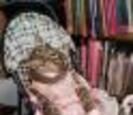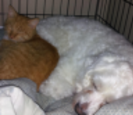Feline Care Guides
CBC and Chemistry Profile
-
Blood testing is commonly used to help diagnose disease or pinpoint injury in animals. It can also help determine the state of your pet’s health during regular physical exam visits. Although a CBC or a chemistry profile can be performed separately, these tests are frequently done at the same time; when the results are interpreted together, they provide a good overview of many of the body’s functions. As with any other diagnostic test, results of a CBC and chemistry profile are not interpreted in a vacuum. Your veterinarian will combine this information with physical exam findings, medical history, and other information to assess your pet’s health status and determine if additional testing should be recommended.
Read More Caring for Orphaned Kittens
-
Orphaned kittens should be taken to a veterinarian immediately. Your veterinarian can give you advice on caring for kittens and might be able to provide you with contact information for animal rescue groups. During the first few weeks of life, kittens need proper nourishment, warmth, socialization, and help with urinating and defecating.
Read More Caring for Your New Kitten
-
During the first 8 to 10 weeks of life, kittens have specific needs for nourishment, warmth, socialization, and excretion. If you find orphaned kittens younger than 8 to 10 weeks of age, take them to a veterinarian immediately. Your veterinarian can give you advice on caring for them and might be able to give you contact information for animal rescue groups. For more information, see the Care Guide titled “Caring for Orphaned Kittens.”
Read More Caring for Your Pet After Surgery
-
The type of surgery that your pet undergoes determines the in-hospital recovery time and when you will be able to pick up your pet. Because the period immediately following surgery is when most complications occur, it is important to follow your veterinarian’s suggestion for when to pick up your pet. If you would like to visit your pet in the hospital, ask your veterinarian if that would be okay.
Read More Cat Litter
-
A variety of cat litters are available commercially, including litters made of clay, plastic, wheat, sawdust, newspaper pellets, and corn cobs. The choice depends on what matters most to you and your cat. You may have to try a few to see what you and your cat like. Most cats prefer unscented, scoopable litter because of its sandlike texture. Many owners prefer scoopable litters because they control odors and absorb liquid (clump) well, making it easy for owners to scoop out urine “balls.” This leaves the remaining litter dry and odor free.
Read More


































